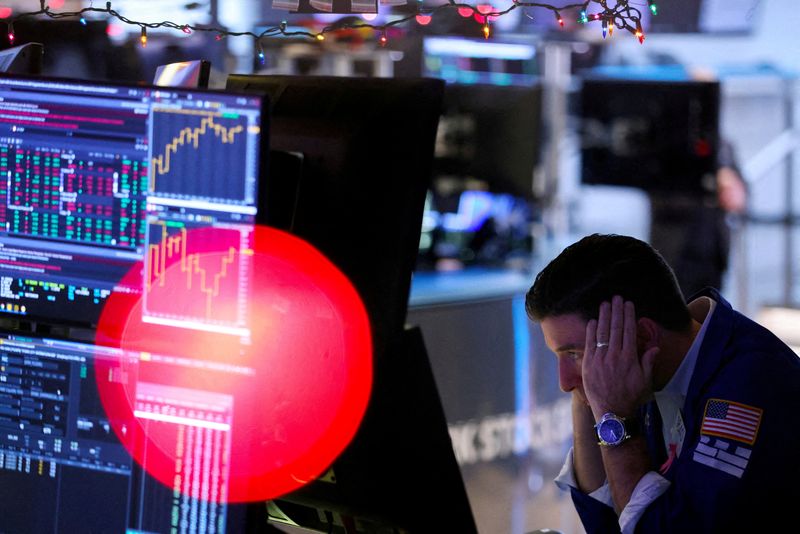
1. Futures inch lower
U.S. stock futures pointed lower on Tuesday, with Wall Street set to begin a new month of trading following a roller-coaster August.
By 08:59 GMT (04:59 EST), the Dow futures contract had shed 123 points or 0.3%, S&P 500 futures had dipped by 21 points or 0.4%, and Nasdaq 100 futures had moved down by 72 points or 0.4%.
The main averages in the U.S. were closed on Monday for the Labor Day holiday.
They ended Friday’s trading session higher, finishing August in positive territory despite a sharp decline to start the month that was fueled in part by worries over a potential U.S. recession. The benchmark S&P 500 had slumped by over 7%, but rebounded to increase by 2.3% in August — its fourth-consecutive winning month.
The 30-stock Dow Jones Industrial Average and tech-heavy Nasdaq Composite also gained 1.8% and 0.7% over the period, respectively.
2. Harris voices opposition to proposed U.S. Steel-Nippon Steel deal
U.S. Democratic presidential hopeful Kamala Harris has signalled that she would block a proposed $14.9 billion takeover of U.S. Steel by Japan’s Nippon Steel.
Speaking to a crowd of supporters in Pennsylvania, a crucial state in the 2024 U.S. presidential election, Harris called U.S. Steel a “historic American company” that “should remain American owned and American operated.”
The comments are similar to objections previously put forward by U.S. President Joe Biden. Harris currently serves as Biden’s vice president.
Harris’s Republican rival, Donald Trump, has also come out against the tie-up, promising to block it.
The bi-partisan opposition to the deal has echoed fierce opposition from the United Steelworkers union, which has urged lawmakers to exmaine whether it would harm U.S. national security interests and U.S. Steel’s domestic workforce. U.S. Steel and Nippon Steel have continued to back the bid, saying it would benefit the U.S. steel industry.
3. Tesla planning six-seat Model Y in China – Reuters
Tesla is set to produce a new six-seat version of its Model Y vehicle, targeting a launch in China by late 2025, Reuters reported Tuesday.
The move is part of the company’s strategy to refresh its best-selling electric vehicle (EV) and enhance the Model Y’s appeal amidst growing competition from domestic EV manufacturers in China.
Tesla has communicated to its suppliers the need to prepare for a significant increase in Model Y production at its Shanghai factory, according to the report.
Although specific details on how Tesla plans to boost output were not disclosed, the Shanghai plant is currently pending approval for an expansion on an adjacent 70-hectare plot of former farmland.
Tesla has already achieved a 6% year-on-year rise in domestic and international deliveries of the Model 3 for the first half of the year, following the introduction of an updated version last year. August was Tesla’s best month in China so far this year, with sales jumping by 37% from July in the world’s second-largest economy.
4. Brazil’s president backs X ban
Brazilian president Luiz Inácio Lula da Silva has thrown his support behind a controversial decision by the country’s Supreme Court to uphold a ban on Elon Musk’s X social media platform.
The left-wing leader told CNN Brasil that the “world is not obliged to put up with Musk’s far-right ideology just because he is rich.”
On Monday, a panel of judges on Brazil’s high court unanimously backed the ban on X. Supreme Court Justice Alexandre de Moraes had instituted the shutdown over the weekend, saying the platform did not comply with hate-speech regulations and other requirements.
Musk responded on X, saying de Moraes was a “dictator.” Billionaire Bill Ackman also warned that the ban could prove to make Brazil, South America’s largest economy, “uninvestable.”
Investors flagged concerns as well around de Moraes’s separate decision to freeze Brazilian bank accounts belonging to Musk’s Starlink satellite broadband business. de Moraes ordered the move last week after X failed to pay fines imposed on it for not adhering to judicial orders.
5. Crude mixed
Crude prices traded in a mixed fashion Tuesday, as traders digested sluggish economic growth in China, the world’s biggest crude importer, as well as the halt of production and exports from Libya.
By 03:15 ET, the Brent contract dropped 0.1% to $77.42 per barrel, while U.S. crude futures (WTI) advanced by 0.2% to $74.17 a barrel, after the contract did not settle on Monday because of the U.S. Labor Day holiday.
China’s purchasing managers’ index hit a six-month low in August, data showed over the weekend, pointing to likely weakening of demand from the world’s biggest crude importer.
However, oil exports at major ports in OPEC-member Libya were halted on Monday and production curtailed across the country, providing some support to oil prices.
To read the full article, Click Here
